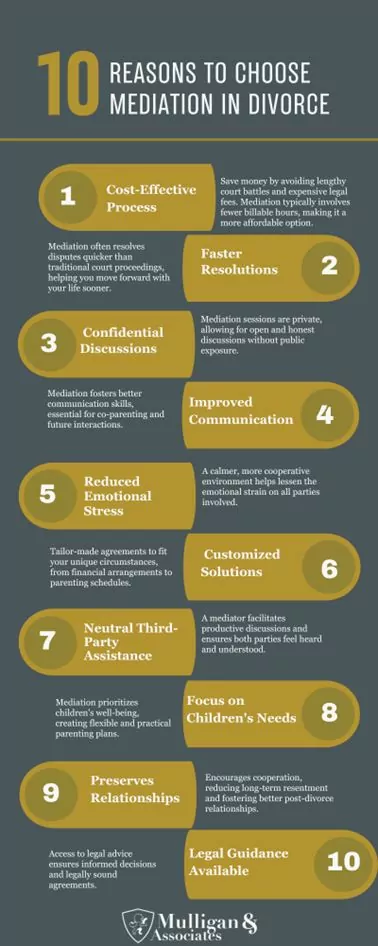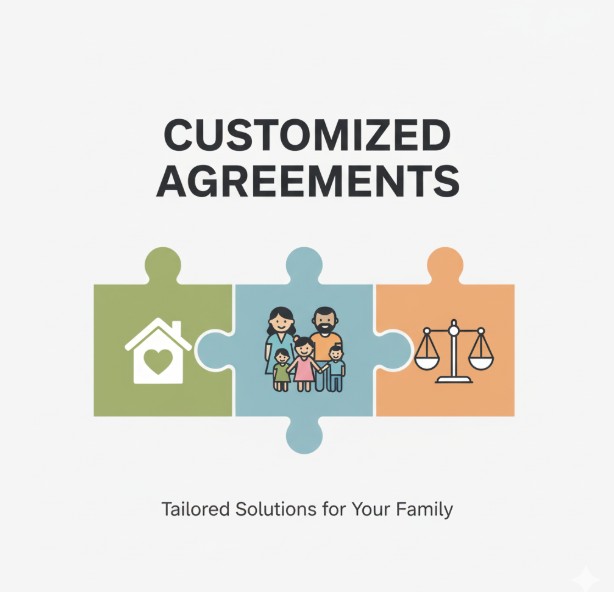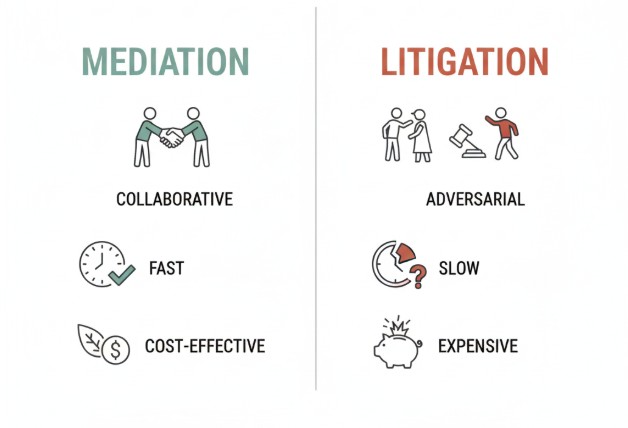Unlocking the Benefits of Mediation in Divorce: 10 Reasons to Choose a Better Path for a Smoother Separation

Divorce doesn’t have to mean years of courtroom battles, drained finances, and lasting bitterness. In Florida, many couples are opting for divorce mediation as a more effective approach.
Mediation gives spouses more control, reduces conflict, and keeps discussions private while helping families move on sooner.
By working with a neutral mediator instead of fighting in court, couples can create fair, flexible agreements that protect both finances and children’s needs.
This article outlines ten clear reasons why mediation often delivers better outcomes than litigation—and why it may be the smoother, more intelligent choice for your separation.
1) Cost-Effective Process

Divorce mediation is usually far less expensive than litigation. Couples share the cost of one mediator instead of paying two lawyers, avoid lengthy court battles, and save on filing fees. Faster resolutions mean fewer billable hours and less financial strain for both parties.
Mediation allows couples to share the expense of a neutral third party instead of each hiring separate attorneys. This can significantly reduce the overall cost of divorce.
Working together to reach agreements can help couples avoid the high costs of drawn-out legal battles. They can also save on court filing fees and other expenses associated with litigation.
Mediation’s flexible nature allows couples to focus on their most important issues. This targeted approach can lead to quicker resolutions and lower overall costs.
Mediation’s streamlined process helps couples move forward with their lives more quickly. They can avoid the financial drain of prolonged legal proceedings and start rebuilding sooner.
2) Faster Resolutions
Mediation allows couples to settle disputes in weeks or months, not years. With flexible scheduling and no dependency on court calendars, issues are resolved faster.
This means families can adapt to new circumstances sooner and avoid the stress of prolonged litigation delays.
Mediation sessions can be scheduled more flexibly, allowing for faster progress. This reduces the delay associated with drawn-out court proceedings.
Mediation typically resolves disputes in weeks or months, unlike litigation, which can drag on for months or even years. This shorter timeline helps couples move forward with their lives more quickly.
The focused nature of mediation encourages efficient problem-solving. Parties work together to address issues directly rather than getting bogged down in legal procedures.
A speedier resolution through mediation can also reduce emotional stress for all involved, including children. It enables families to adapt to new circumstances more quickly.
Couples can avoid the backlog often found in family courts by choosing mediation. This means less waiting and more action towards finalizing the divorce agreement.

3) Confidential Discussions
Mediation sessions are private and confidential, unlike public court proceedings. This gives spouses the freedom to discuss sensitive topics—such as finances, custody, and personal concerns—without fear of exposure.
Confidentiality fosters openness, protects children, and enables both parties to explore solutions safely before reaching a final agreement.
This privacy allows both parties to speak freely without fear of their words being used against them later. They can discuss sensitive topics, such as finances and child custody arrangements, openly.
Professional ethics require the mediator to maintain the confidentiality of all information shared during sessions. This confidentiality extends to any documents or proposals exchanged during the process.
Couples can test out different solutions without worrying about premature commitments. They have the freedom to explore various options before reaching a final agreement.
The confidential nature of mediation also helps protect children from parental conflicts. It keeps personal matters within the family, shielding them from public scrutiny.
Mulligan & Associates makes divorce mediation in Florida more affordable and less stressful. Discover a smoother path to resolution for your family—contact us today to schedule.
4) Improved Communication

A key benefit of mediation is better communication. Guided by a neutral mediator, couples learn to listen respectfully, express their needs clearly, and focus on finding solutions rather than blaming each other.
These skills are beneficial during mediation and support healthier co-parenting relationships long after the divorce is finalized.
Mediation teaches spouses to listen actively. They learn to hear each other without interrupting or getting defensive. This skill is useful during and after the divorce process.
Open communication is key for couples who will co-parent after divorce. Mediation helps them practice discussing tough topics in a calm and respectful manner. This can lead to better teamwork when raising children together.
Mediators use techniques to reduce conflict. They rephrase negative statements more neutrally, helping couples focus on solutions instead of blame.
The skills learned in mediation can improve future interactions. Couples often find they can handle disagreements more calmly after this process. This can make post-divorce life easier for everyone involved.
5) Reduced Emotional Stress
Divorce can be a highly stressful experience. Mediation offers a way to lessen the emotional toll on both parties.
Emotions often run high in traditional divorce proceedings, which can lead to increased conflict and tension between spouses.
Mediation provides a calmer environment. It encourages open communication and cooperation between the divorcing couple.
The mediator acts as a neutral third party. They help keep discussions focused and productive. This can prevent arguments from escalating.
A key benefit of mediation is preserving dignity and respect. It allows couples to work together rather than against each other.
Mediation can help reduce feelings of anger and resentment. It allows both parties to express their needs and concerns in a safe space.
By choosing mediation, couples often feel more in control of the process. This sense of empowerment can ease anxiety and stress.
The collaborative nature of mediation can also help maintain better relationships post-divorce. This is especially important for couples with children.
6) Customized Solutions

Mediation empowers couples to design personalized agreements. Parenting plans, financial arrangements, and even unique issues like pet custody can be tailored to fit family needs.
This flexibility ensures solutions are practical, fair, and more likely to be followed, unlike one-size-fits-all court rulings.
Mediators help couples discuss their specific needs and concerns, which leads to agreements that work for both parties and their children.
In mediation, spouses can address unusual circumstances or special requirements. For example, they might create a unique parenting schedule for their work lives.
Financial arrangements can also be customized. Couples may find creative ways to divide assets or handle debt that a court might not consider.
Mediation allows for flexible solutions to issues such as pet custody or family heirlooms. These personal matters often get overlooked in standard court proceedings.
The ability to craft personalized agreements often leads to higher satisfaction with the divorce outcome. It can also enhance both parties’ chances of fulfilling their commitments.
7) Neutral Third-Party Assistance
A mediator is a neutral guide who helps couples focus on productive discussions. They don’t take sides or make decisions; instead, they keep sessions balanced, fair, and solution-oriented.
This equal footing encourages both spouses to voice concerns and work toward mutually acceptable agreements.
Mediators help spouses communicate more effectively. They can rephrase statements to reduce conflict and ensure both parties feel heard.
These professionals have experience with common issues related to divorce. They can offer creative solutions when couples get stuck on a particular topic.
Mediators also keep the process moving. They set agendas for sessions and ensure that all important matters are addressed.
With a neutral party present, spouses often feel more comfortable expressing their needs and concerns. This can lead to more open and honest discussions.
The mediator’s presence can also help balance power dynamics between spouses. They ensure both parties have equal opportunities to speak and be understood.
Considering divorce mediation? Mulligan & Associates helps couples find solutions tailored to parenting and finances. Protect your future with clarity and confidence—reach out now to schedule a consultation.
8) Focus on Children’s Needs
Mediation prioritizes the best interests of children. Parents work together to create parenting plans, school and activity schedules, and custody arrangements that support stability.
This cooperative process shields children from conflict and promotes healthier co-parenting after divorce, reducing long-term emotional strain.
Divorce mediation can protect kids from the stress of courtroom battles. Children benefit when their parents work together and make decisions collaboratively.
In mediation, parents learn to communicate better about their children’s needs. This skill helps them co-parent more effectively after the divorce is final.
Mediation also gives parents a chance to discuss how to tell their children about the divorce. They can plan how to support their kids through this big change.
9) Preserves Relationships
Unlike adversarial litigation, mediation helps preserve important relationships. Couples communicate directly, which supports cooperation and reduces hostility.
This not only benefits children but also makes it easier for extended family and mutual friends to maintain healthy connections with both parents after divorce.
This collaborative process allows spouses to communicate directly. They can express their needs and concerns in a less hostile environment. This often leads to better understanding between parties.
Mediation can also help preserve relationships with children. Parents who mediate are more likely to cooperate in co-parenting after divorce, creating a more stable environment for children.
Extended family relationships can also benefit. When the divorce process is less adversarial, in-laws and other relatives are less likely to take sides.
Friends often feel torn between divorcing couples. Mediation can reduce tension and make it easier for mutual friends to maintain connections with both parties.
Reduced stress and emotional strain during mediation can prevent long-lasting resentment. This makes it easier for ex-spouses to interact civilly in the future, especially at family events.
10) Legal Guidance Available
Choosing mediation doesn’t mean giving up legal support. Couples can consult attorneys to review agreements and explain their rights.
Mediators also clarify legal concepts, ensuring both parties understand their responsibilities. This combination of collaboration and legal guidance ensures that agreements are fair, enforceable, and durable in court.
Spouses can also consult their attorneys outside of mediation sessions. These lawyers can review agreements and offer personalized advice. They make sure their client’s interests are protected.
Legal guidance helps spouses navigate complex issues like asset division and child custody. It reduces the risk of overlooking important legal details, and with proper legal input, mediated agreements are more likely to hold up in court.
Having access to legal expertise gives spouses confidence in the mediation process. It allows them to make choices that are both fair and legally sound. This balance of collaborative problem-solving and legal protection is a key benefit of divorce mediation.
Preparing for Mediation

Getting ready for divorce mediation involves key steps to ensure a smooth process. Proper preparation helps couples maximize their sessions and work towards fair resolutions.
Choosing the Right Mediator
Selecting a skilled mediator is crucial for successful divorce mediation. Look for someone with experience in family law and divorce cases.
Check their credentials and training in mediation techniques.
Ask potential mediators about their approach and style. Some use a more directive method, while others facilitate open discussions. Choose someone who fits your needs and communication style.
Consider the mediator’s fees and availability. Make sure their schedule aligns with yours. Some mediators offer free consultations, which can help you gauge if they’re a good fit.
Gathering Necessary Information
Collect all relevant financial documents prior to mediation commencing. This includes tax returns, bank statements, property deeds, and retirement account info. Having these ready saves time and helps make informed decisions.
Make a list of assets and debts to discuss. Include both joint and individual items. This helps ensure everything is noticed during negotiations.
Prepare a budget outlining your current and future expenses. This aids in discussions about support payments and asset division. Be realistic about your financial needs and goals.
If you have kids, consider your priorities for child custody and visitation. Consider practical arrangements that work for your family’s schedule and needs.
From preparing documents to finalizing agreements, Mulligan & Associates ensures divorce mediation stays efficient and respectful. Choose a better way forward—contact us today to schedule your session.
Frequently Asked Questions
What is divorce mediation?
Divorce mediation is a private process in which a neutral mediator helps spouses negotiate agreements on issues such as property division, custody, and support—without going to trial.
Is divorce mediation legally binding in Florida?
Yes. Once both spouses agree and the court approves the mediated settlement, it becomes legally binding and enforceable just like a judge’s order.
How much does divorce mediation cost compared to litigation?
Mediation is generally far less expensive than traditional litigation. Couples share the mediator’s fee, avoid repeated court hearings, and resolve issues faster, saving thousands in legal costs.
How long does divorce mediation take?
Most mediation cases are resolved within weeks or a few months, depending on their complexity. This is much faster than litigation, which can take many months or even years.
Can divorce mediation work if spouses don’t get along?
Yes. Skilled mediators employ conflict-resolution techniques to maintain productive discussions. Even in high-conflict cases, mediation can produce agreements that both parties accept.
What are the benefits of mediation for children?
Mediation reduces conflict, shields children from courtroom disputes, and helps parents design customized parenting plans. This cooperative approach fosters stability and reduces stress for children during divorce.
Do I need a lawyer if I use mediation?
It’s recommended. Attorneys can review agreements, explain rights, and ensure settlements are fair and enforceable, even if the mediator facilitates the discussion.
Is mediation confidential?
Yes. Mediation sessions are private, unlike public court hearings. This confidentiality allows spouses to discuss sensitive issues openly and explore solutions without fear of exposure.
